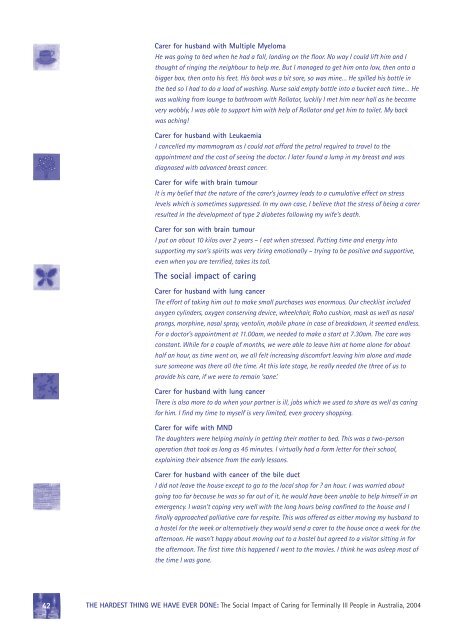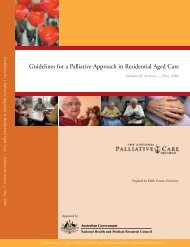The hardest thing we have ever done - Palliative Care Australia
The hardest thing we have ever done - Palliative Care Australia
The hardest thing we have ever done - Palliative Care Australia
Create successful ePaper yourself
Turn your PDF publications into a flip-book with our unique Google optimized e-Paper software.
<strong>Care</strong>r for husband with Multiple Myeloma<br />
He was going to bed when he had a fall, landing on the floor. No way I could lift him and I<br />
thought of ringing the neighbour to help me. But I managed to get him onto low, then onto a<br />
bigger box, then onto his feet. His back was a bit sore, so was mine… He spilled his bottle in<br />
the bed so I had to do a load of washing. Nurse said empty bottle into a bucket each time… He<br />
was walking from lounge to bathroom with Rollator, luckily I met him near hall as he became<br />
very wobbly, I was able to support him with help of Rollator and get him to toilet. My back<br />
was aching!<br />
<strong>Care</strong>r for husband with Leukaemia<br />
I cancelled my mammogram as I could not afford the petrol required to travel to the<br />
appointment and the cost of seeing the doctor. I later found a lump in my breast and was<br />
diagnosed with advanced breast cancer.<br />
<strong>Care</strong>r for wife with brain tumour<br />
It is my belief that the nature of the carer’s journey leads to a cumulative effect on stress<br />
levels which is sometimes suppressed. In my own case, I believe that the stress of being a carer<br />
resulted in the development of type 2 diabetes following my wife’s death.<br />
<strong>Care</strong>r for son with brain tumour<br />
I put on about 10 kilos over 2 years – I eat when stressed. Putting time and energy into<br />
supporting my son’s spirits was very tiring emotionally – trying to be positive and supportive,<br />
even when you are terrified, takes its toll.<br />
<strong>The</strong> social impact of caring<br />
<strong>Care</strong>r for husband with lung cancer<br />
<strong>The</strong> effort of taking him out to make small purchases was enormous. Our checklist included<br />
oxygen cylinders, oxygen conserving device, wheelchair, Roho cushion, mask as <strong>we</strong>ll as nasal<br />
prongs, morphine, nasal spray, ventolin, mobile phone in case of breakdown, it seemed endless.<br />
For a doctor’s appointment at 11.00am, <strong>we</strong> needed to make a start at 7.30am. <strong>The</strong> care was<br />
constant. While for a couple of months, <strong>we</strong> <strong>we</strong>re able to leave him at home alone for about<br />
half an hour, as time <strong>we</strong>nt on, <strong>we</strong> all felt increasing discomfort leaving him alone and made<br />
sure someone was there all the time. At this late stage, he really needed the three of us to<br />
provide his care, if <strong>we</strong> <strong>we</strong>re to remain ‘sane’.<br />
<strong>Care</strong>r for husband with lung cancer<br />
<strong>The</strong>re is also more to do when your partner is ill, jobs which <strong>we</strong> used to share as <strong>we</strong>ll as caring<br />
for him. I find my time to myself is very limited, even grocery shopping.<br />
<strong>Care</strong>r for wife with MND<br />
<strong>The</strong> daughters <strong>we</strong>re helping mainly in getting their mother to bed. This was a two-person<br />
operation that took as long as 45 minutes. I virtually had a form letter for their school,<br />
explaining their absence from the early lessons.<br />
<strong>Care</strong>r for husband with cancer of the bile duct<br />
I did not leave the house except to go to the local shop for ? an hour. I was worried about<br />
going too far because he was so far out of it, he would <strong>have</strong> been unable to help himself in an<br />
emergency. I wasn’t coping very <strong>we</strong>ll with the long hours being confined to the house and I<br />
finally approached palliative care for respite. This was offered as either moving my husband to<br />
a hostel for the <strong>we</strong>ek or alternatively they would send a carer to the house once a <strong>we</strong>ek for the<br />
afternoon. He wasn’t happy about moving out to a hostel but agreed to a visitor sitting in for<br />
the afternoon. <strong>The</strong> first time this happened I <strong>we</strong>nt to the movies. I think he was asleep most of<br />
the time I was gone.<br />
42 THE HARDEST THING WE HAVE EVER DONE: <strong>The</strong> Social Impact of Caring for Terminally Ill People in <strong>Australia</strong>, 2004
















